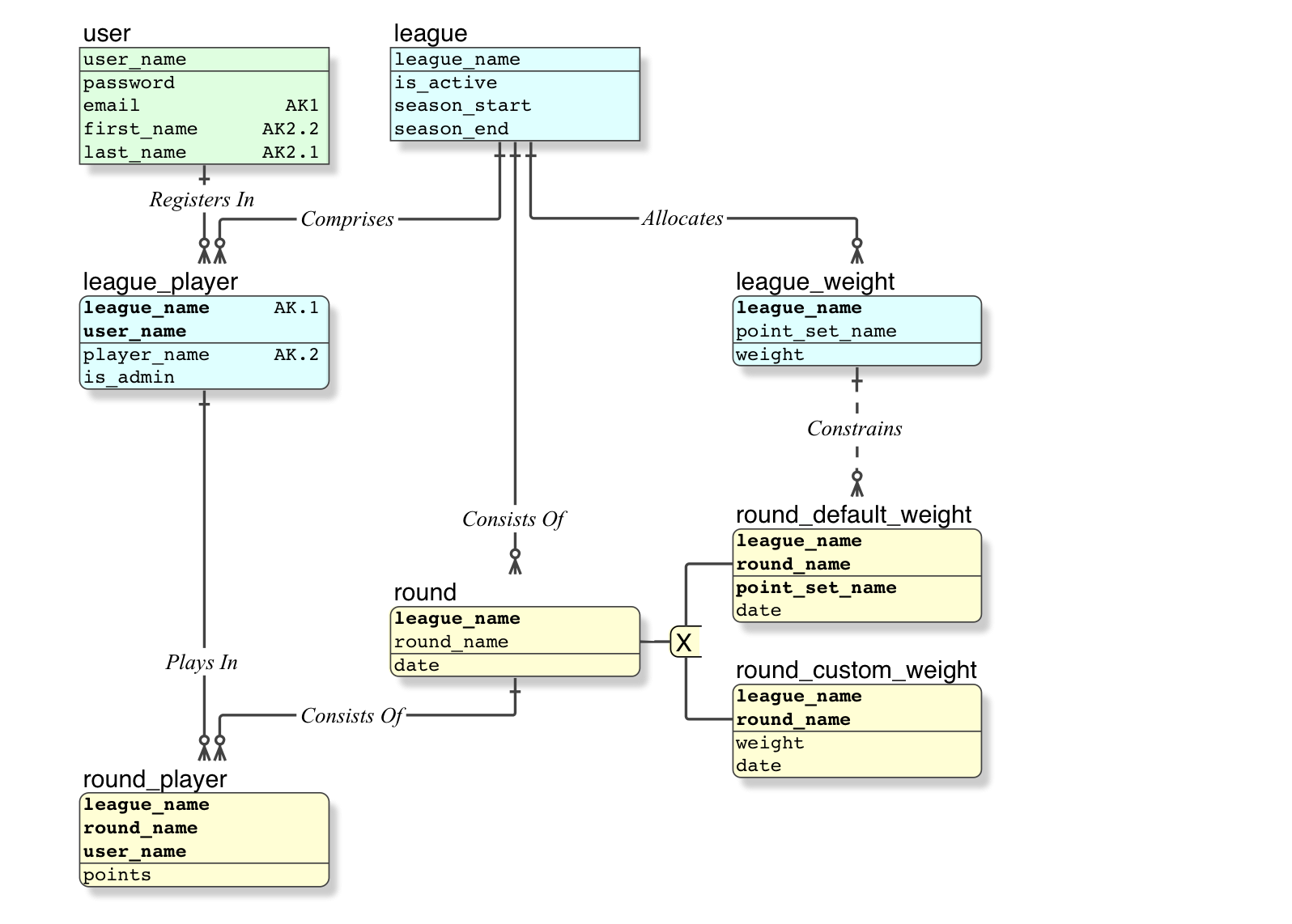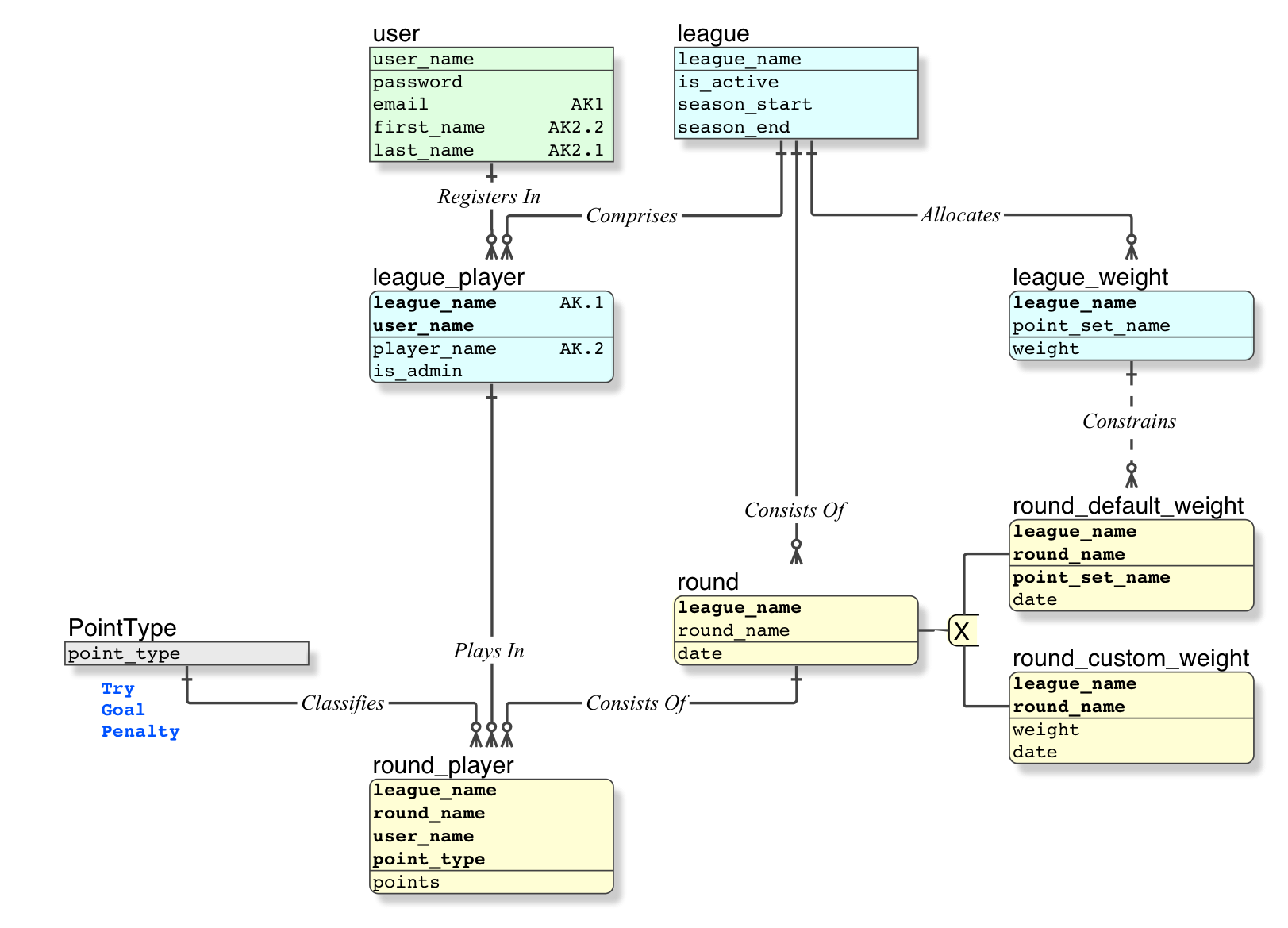Structuring database relationships for tracking different variations of app settings
An app I\'m currently designing allows users to create custom competitive leagues (think of it kind of like fantasy sports) and each user can join different leagues and each
-
Confirmation
[Paraphrased] Because the point settings could vary from round-to-round, should I have:
- one table for the default league-level point setting
- and then another for round-level point setting
that will record the point setting actually implemented for each round?
Yes. What you are implicitly declaring is, a round has one setting, which is:
- either the league-level setting
- or a custom setting.
That is a typical OR Gate in Logic, and there is a correct method to implement that in a RElational database: an Exclusive Subtype.
I currently have one table for league player and one for round player
That is correct: they are two discrete Facts, the latter is Dependent on the former. That means:
- a player has to first be registered as a league_player
- consequently, a player can be registered as a round_player
- and only in a league in which he is registered as a league_player.
and then table that tracks the points earned for each player that basically has foreign keys linking to a bunch of other tables
Your data model goes off the rails at that point.
Problem
Evidently, you have learned the value of data integrity. Eg. you are attempting to ensure that a player in a round in a league is actually a player who is registered in that league; etc. Excellent. You are trying to achieve Relational Integrity, which is logical (and distinct from Referential Integrity, which is a physical feature of SQL).
- You have figured out that the only way to do that is to use Composite Keys. Excellent. Composite Keys are ordinary fare in a Relational database.
The second problem, however, is that you don't have keys, you have physical
Record IDs... declared as "keys". Therefore the logical thing (data is logical) that you are trying to constrain isn't constrained. And that effort, that attempt, results in scores of relationships ... that do not achieve the desired result.Relational Key
- As defined by Dr E F Codd in the Relational Model:
- a [Relational, logical] Key is made up from the data
- references are by logical Relational Key
- In 1960's Record Filing Systems, which are heavily marketed by the "theoreticians" and fraudulently named "relational":
- references are by physical
Record ID. - Such primitive systems have no Relational Integrity; no Relational Power; and no Relational Speed.
- references are by physical
- As defined by Dr E F Codd in the Relational Model:
You are using
Record IDsdeclared as "keys" (that will confuse the hell out of you, because it is not a Key, and it has none of the properties of a Key). And then trying to get some Relational Integrity (which you intuitively know only the Relational Model provides) through Composite Keys ... but you are using the declared Non-Keys, so it fails, and makes a complex model in the attempt.- The correction is to use logical Relational Keys, and to avoid physical
Record IDs
- The correction is to use logical Relational Keys, and to avoid physical
Also, your
CPKis a great attempt to overcome the limitations of the "theoreticians", but it does not specify precisely what columns make it up. That is easily corrected if you use IDEF1X (the standard for modelling Relational data): the columns that make up the Key, Primary or Alternate, are explicit.The next problem is, your logical rows (as distinct from physical records) are not unique, and the RM demands that logical rows are unique.
- Eg. in
User,usernameis not unique

usernameis actually the logical Key (which would make the rows unique)- you also need uniqueness on
(first_name, last_name), which is a second logical Key - If you understand the above, you will understand that:
user_idis 100% useless (achieves nothing, it is merely an additional column and an additional index, which is to be avoided)usernameis the real, logical,PRIMARY KEY, which is migrated asFOREIGN KEYwherever it is referenced.- The FK reference is therefore logical, to the thing itself, and not physical, to the pointer to a record in which the thing might be.
- Eg. in
Likewise, you can get rid of all the
Record IDs.
Relational Data Model
You have been schooled in the physical (falsely named "relational"), and you have tried to 'move up' into the logical. Great idea, but that does not work. The logical comes first, and when ready, one 'moves down' into the physical. The physical serves the logical, not the reverse.
Try this.

Note • Notation
All my data models are rendered in IDEF1X, the Standard for modelling Relational databases since 1993
My IDEF1X Introduction is essential reading for beginners
The IDEF1X Anatomy is a refresher for those who have lapsed.
Note • Content
Relational Key
- All Keys are logical Relational Keys, which are Composites
- All data is constrained by Relational Keys (this is Relational Integrity)
- A
round_playermust be registered in theleaguethat theroundis in - A
round_default_weightmust be one of the validleague_weightsthat have been set up for theleaguethat theroundis in - Et cetera
- If you have difficulty either (a) declaring or (b) coding the Foreign Keys, which are Composites, let me know and I will provide it.
Exclusive Subtype
- Each
roundhas either oneround_default_weightxor oneround_custom_weight - Refer to Subtype for full details on Subtype implementation.
- Each
I do not understand what you mean precisely by
point_setting. I understand it to be a weight that is applied to the score, which is modelled.I do not understand why you have
Point Earnedas a separate file (ie. separate to the issue of multiple parents). That appears to be one record per point scored. Assuming that only players can score points, you can instead accumulate points into theround_playerrow.Your design allows multiple admins per
league, not one. Please confirm.
Enjoy. Please feel free to ask specific questions. There may be clarifications: when identified, I will issue a progressed data model.
Comments
If I track points in the
round_playertable would I only be able to track the total points earned during around?Yes.
For the points earned in each round I wanted to keep track of each point accrued by each player during each round so that you can look back and see the specific types of points and in what quantities they were earned for a player.
Ok. Try this.

There is no need to maintain one row per
round_playerperroundperpoint. We can maintain a row perpoint_typecontaining total points perpoint_typeinstead.You need to specify the
point_types(I have given rugby point types as an example).It is a normal table, not a Reference or "look-up" table, because the relation is Identifying.
讨论(0)
- 热议问题

 加载中...
加载中...